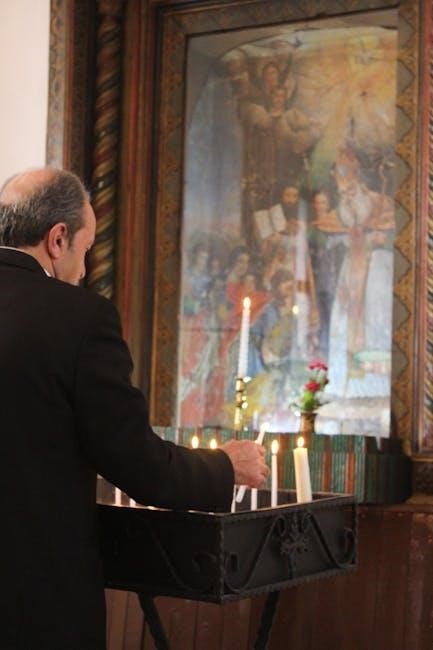The Janaza Prayer is a congregational Islamic funeral prayer performed for the deceased, seeking divine pardon and mercy. It involves four Takbeers, Durood, and specific supplications, emphasizing communal obligation and spiritual support. PDF guides provide detailed instructions and duas for performing this sacred ritual correctly.
Significance of Janaza Prayer in Islam
The Janaza Prayer holds profound significance in Islam as a communal act of worship and solidarity. It is a means of seeking divine forgiveness for the deceased and offering comfort to the grieving family. Performing the prayer demonstrates respect for the departed soul and fulfills a collective religious duty. The prayer emphasizes the importance of unity and shared responsibility among Muslims. By participating, believers earn spiritual rewards and strengthen their bond with the community. The practice also serves as a reminder of life’s transience and the ultimate return to Allah. PDF guides on Janaza Prayer highlight its virtues and provide detailed supplications for the deceased.
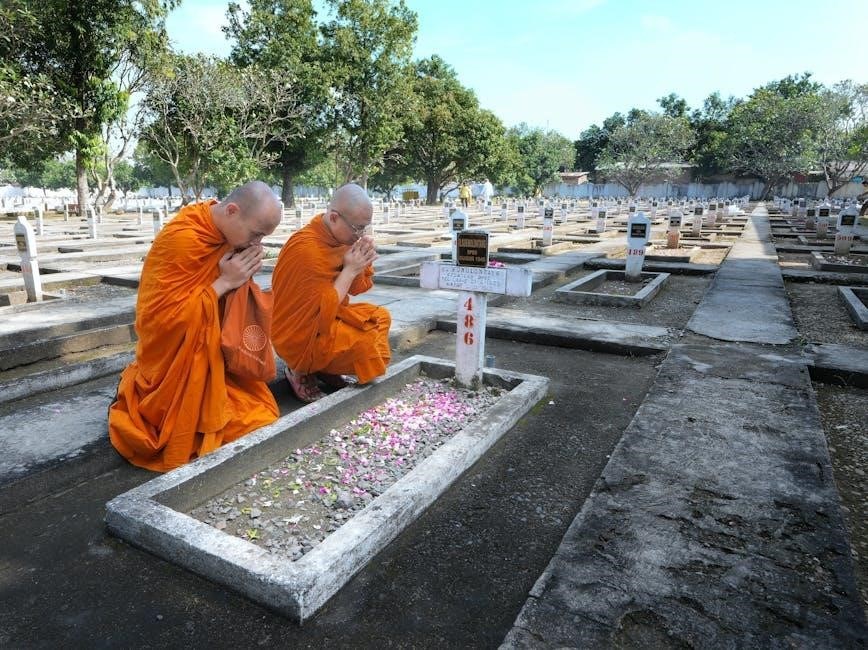
Structure of the Janaza Prayer
The Janaza Prayer consists of four Takbeers, Thana, Durood, and a specific dua for the deceased, all performed while standing. It does not include ruku or sujud.
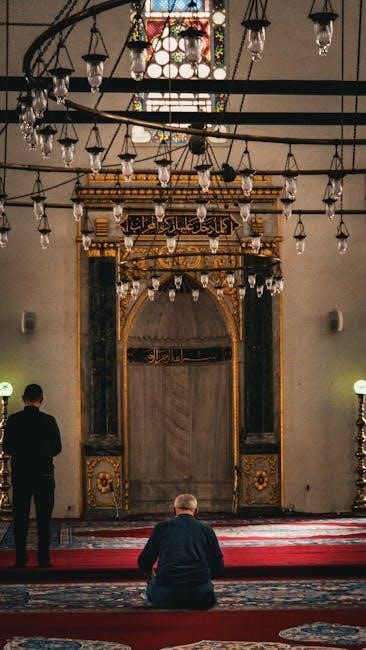
Four Takbeers in the Janaza Prayer
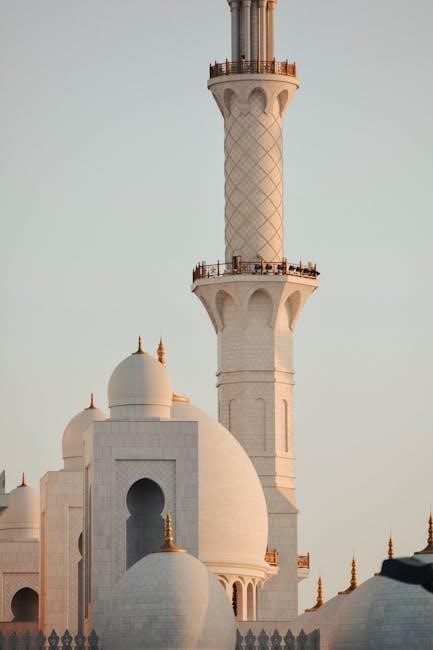
The Janaza Prayer begins with four distinct Takbeers, each serving a specific purpose. The first Takbeer (Allahu Akbar) initiates the prayer, followed by the Thana. The second Takbeer comes after the Thana, the third after the Durood, and the fourth precedes the final dua for the deceased. Each Takbeer is recited while standing, and between them, specific supplications are performed. The Takbeers are integral to the structure, ensuring the prayer’s validity and emphasizing the congregation’s collective appeal for mercy. The four Takbeers are a unique feature of the Janaza Prayer, distinguishing it from other Islamic prayers. They are performed with utmost sincerity, seeking divine forgiveness.
Thana (Glory to God)
The Thana is a sacred supplication recited in the Janaza Prayer, following the first Takbeer. It begins with glorifying God and seeking His mercy, emphasizing humility and devotion. The Thana is a Sunnah and is typically recited in Arabic, praising Allah’s greatness and acknowledging His sovereignty. It serves as a spiritual connection, expressing gratitude for divine guidance and seeking blessings for the deceased. The Thana is a heartfelt invocation, setting the tone for the rest of the prayer. Its recitation is a collective act of worship, uniting the congregation in their appeal for divine forgiveness and mercy for the departed soul. It is a pivotal component of the Janaza Prayer.
Durood (Blessings on the Prophet Muhammad)
The Durood is a sacred invocation of blessings upon Prophet Muhammad (peace be upon him), recited after the Thana in the Janaza Prayer. It is a Sunnah and a deeply revered act of worship, expressing love and gratitude for the Prophet’s guidance; The Durood is typically recited in Arabic, invoking divine peace and blessings upon him and his family. A common Durood recited is the “Abrahamic Prayer,” which seeks blessings for the Prophet as Allah blessed Prophet Ibrahim and his family. This supplication strengthens spiritual connection and is a vital part of the prayer, fostering unity among worshippers while honoring the Prophet’s legacy. Its recitation is a heartfelt tribute and a means of seeking divine favor for the deceased.
Dua for the Deceased
The Dua for the deceased is a heartfelt supplication recited during the Janaza Prayer, seeking divine forgiveness, mercy, and eternal peace for the departed soul. It is recited after the third and fourth Takbeers, emphasizing the community’s collective appeal for the deceased’s pardon. The Dua includes specific prayers, such as the Abrahamic Prayer, which blesses Prophet Muhammad (peace be upon him) and his family, while also requesting similar blessings for the deceased. These supplications are recited while standing, reflecting the congregation’s spiritual support and hope for the deceased’s acceptance in the afterlife. They are a deeply emotional and meaningful part of the funeral rites, expressing compassion and seeking divine grace for the departed.
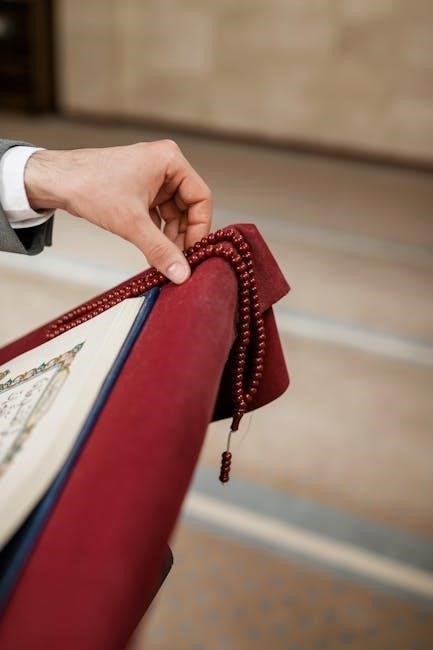
Required Conditions for Performing Janaza Prayer
Performing Janaza Prayer requires state of purity, Wudu, and covering the Awrah. These conditions ensure the prayer’s validity and adherence to Islamic rituals, reflecting respect and devotion.
State of Purity (Tahara)
Tahara, or state of purity, is essential for performing the Janaza Prayer. This includes ensuring the body, clothing, and prayer area are clean from any impurities. Muslims must perform Wudu or Ghusl if necessary before participating. The deceased’s body must also be washed and shrouded according to Islamic guidelines. Maintaining Tahara reflects respect for the sacredness of the prayer and adherence to divine instructions. Neglecting this condition invalidates the prayer, emphasizing its critical role in the ritual. Proper purification ensures a spiritually clean environment for seeking forgiveness for the deceased. This fundamental principle underscores the importance of physical and spiritual cleanliness in Islamic worship.

Wudu (Ablution)
Performing Wudu (ablution) is a prerequisite for participating in the Janaza Prayer. It involves washing the face, arms, head, and feet in a specific manner to attain spiritual purity. Wudu ensures the participant is in a state of cleanliness, reflecting reverence for the divine ritual. The absence of valid Wudu invalidates the prayer, emphasizing its importance. Properly performed Wudu strengthens the connection with Allah and aligns with Islamic teachings on physical and spiritual hygiene. It is a fundamental act of worship that prepares the believer to seek mercy and forgiveness for the deceased during the Janaza Prayer. This practice underscores the unity of physical and spiritual purity in Islamic rituals.
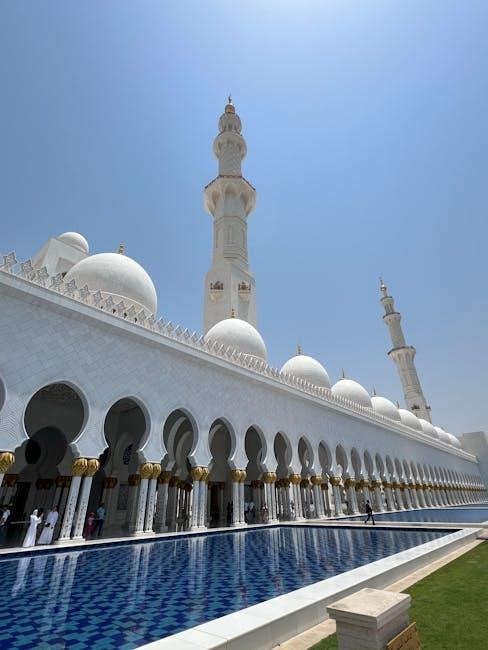
Covering the Awrah
Covering the Awrah is a critical requirement for performing the Janaza Prayer. The Awrah refers to the parts of the body that must be concealed during worship. For men, it includes the area from the navel to the knees, while for women, it involves covering the entire body except the face, hands, and feet. Proper attire ensures modesty and adherence to Islamic norms. During the Janaza Prayer, participants must ensure their clothing fully covers the Awrah to maintain the sanctity of the ritual. This practice reflects the importance of humility and reverence in worship, aligning with Islamic teachings on modesty and spiritual purity.
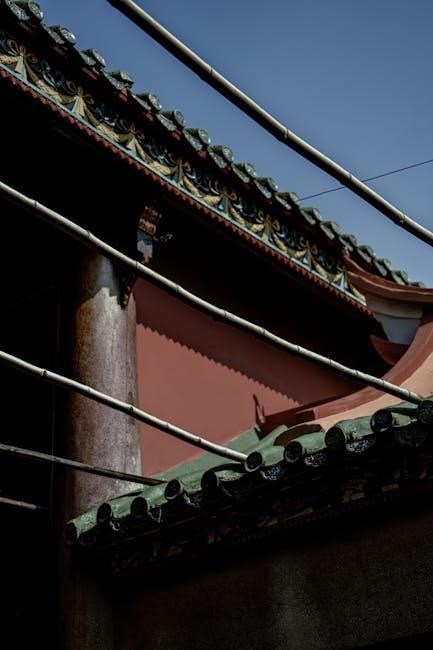
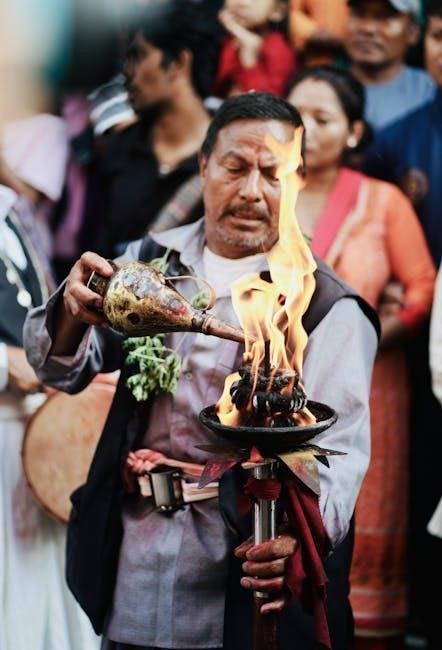
Communal Obligation (Fard Kifayah) of Janaza Prayer
The Janaza Prayer holds the status of Fard Kifayah, meaning it is a communal obligation. This implies that if a sufficient number of Muslims in a community perform the prayer, the responsibility is fulfilled for all. However, if no one performs it, the entire community bears the sin. Participating in the Janaza Prayer is a collective duty, emphasizing the importance of unity and shared responsibility among Muslims. It is essential for at least three rows of worshippers to be formed, demonstrating solidarity and respect for the deceased. This obligation underscores the Islamic value of caring for one another, especially in times of bereavement and loss.
Importance of Dua in Janaza Prayer
Dua in Janaza Prayer is crucial for seeking divine mercy and forgiveness for the deceased. It conveys heartfelt prayers and blessings, strengthening the spiritual connection and ensuring the deceased’s soul is elevated. PDF guides offer recommended supplications, enhancing the prayer’s effectiveness.
Recommended Dua After the Third and Fourth Takbirs
After the third and fourth Takbirs in the Janaza Prayer, specific supplications are recommended to seek divine mercy for the deceased and guidance for the living. These duas are deeply rooted in Islamic tradition and are often outlined in PDF guides available online. After the third Takbir, a dua is recited asking Allah for forgiveness and mercy for the deceased, while after the fourth Takbir, a supplication is made for the Muslim community and the living to remain steadfast on the right path. These prayers emphasize the importance of seeking divine intercession and blessings during the funeral rites.
- Dua after the third Takbir focuses on the deceased’s forgiveness and mercy.
- Dua after the fourth Takbir seeks guidance and protection for the living.
Reciting the Abrahamic Prayer
The Abrahamic Prayer is a significant supplication recited during the Janaza Prayer, invoking divine blessings and peace upon Prophet Muhammad (pbuh) and his family. It is recited after the fourth Takbir and is a beautiful emulation of the prayer offered by Prophet Ibrahim for his family. The prayer seeks Allah’s mercy, peace, and blessings, emphasizing the Prophet’s exalted status. PDF guides often include this prayer, highlighting its importance in Islamic tradition. It is a heartfelt way to honor the Prophet and seek divine favor for the deceased and the Muslim community.
- Invokes blessings and peace upon Prophet Muhammad and his family.
- Recited after the fourth Takbir in the Janaza Prayer.
- Seeks divine favor and intercession for the deceased and living.
PDF Resources for Janaza Prayer and Dua
A comprehensive PDF guide on Janaza Prayer and dua is available, offering detailed instructions, supplications, and step-by-step procedures for performing the funeral prayer according to Islamic traditions.
Popular PDF Guides Available Online
Several PDF guides are available online to facilitate the proper performance of Janaza Prayer and its associated supplications. Titles such as “Namaaz E Janaza Padhne Ka Saheeh Aur Mudallal” and “NAMAZ E JANAZAH AUR USKE MASAIL” provide detailed instructions. These resources cover the structure of the prayer, including the four Takbeers, Thana, Durood, and specific duas for the deceased. Guides like “Quran Hadith Janazah PDF Download” and “The Rulings of the Janazah PDF Download” offer insights into the religious significance and legal rulings. Additionally, “Salatul-Janaza Ka Masnoon Tareeqa Urdu” and “Salatul-Janaza Free PDF Download” are popular for their clear step-by-step explanations in Urdu. These PDF resources are invaluable for understanding and performing the Janaza Prayer correctly.
Downloadable Resources for Funeral Prayer
Various downloadable resources are available to guide individuals in performing the Janaza Prayer and its associated supplications. These include comprehensive PDF guides such as “Namaaz E Janaza Ki Dua” and “Salatul-Janaza Ka Masnoon Tareeqa Urdu,” which offer detailed step-by-step instructions. Other resources like “The Rulings of the Janazah PDF Download” and “Religious Book JANAZAH GUIDE-HORBAP” provide in-depth insights into the religious and legal aspects of the prayer. Additionally, “Quran Hadith Janazah PDF Download” and “Salatul-Janaza Free PDF Download” are widely accessible, ensuring that Muslims worldwide can perform the funeral prayer with accuracy and devotion. These resources are essential for understanding and fulfilling the obligations of the Janaza Prayer.
The Janaza Prayer is a vital Islamic obligation, emphasizing communal unity and spiritual support for the deceased; It involves specific rituals, including four Takbeers, Thana, Durood, and heartfelt supplications. The availability of PDF resources has made it easier for Muslims to understand and perform the prayer correctly. These guides provide detailed instructions, ensuring adherence to Islamic traditions. The prayer not only honors the departed but also strengthens the community’s faith and solidarity. By fulfilling this duty, Muslims demonstrate their commitment to upholding Islamic values and seeking divine mercy for the deceased and themselves. The Janaza Prayer remains a profound act of worship and compassion.
